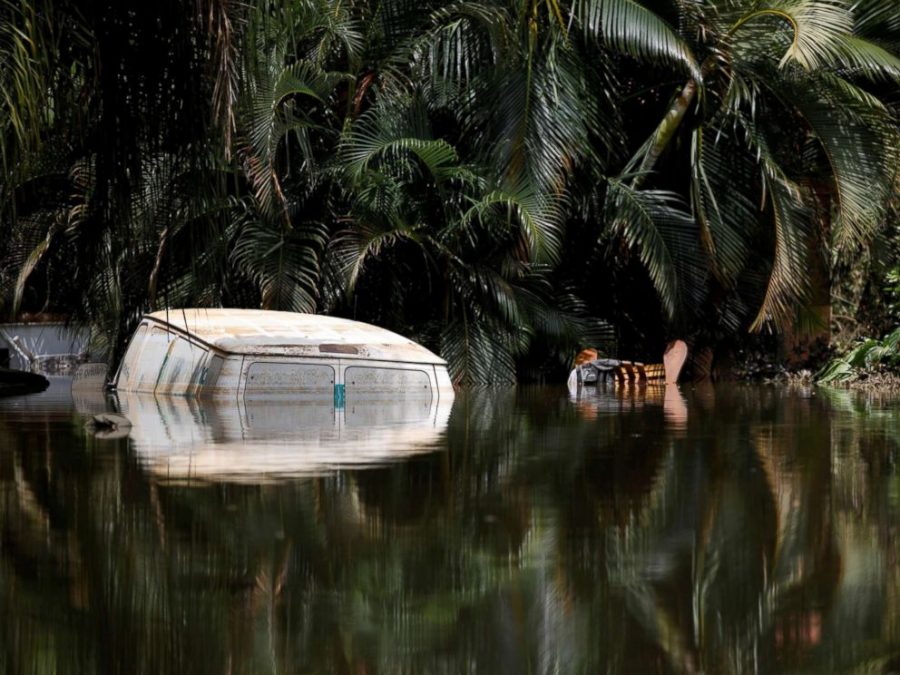Puerto Rico, Post Hurricane Maria
November 3, 2017
Hurricane Maria struck Puerto Rico on September 20th 2017, with multiple feet of rain and brutal winds that escalated up to 155 miles per an hour. The Category 4 storm left the island in ruins and many of its inhabitants without basic necessities and as of now the death toll is 48 and has been slowly rising.
It is expected to take months for the Island to be fully restored with power. However, many Puerto Ricans are not even approaching recovery; they are simply surviving. In the Island’s hot climate, over 40% of citizens have no clean drinking water, 84% have no electricity and 6000 people have been placed in shelters. Hospitals, for the most part, have remained open and are currently operating with inconsistent electricity.
With 84% of the island without electricity or power, it has been a struggle for many Puerto Ricans living in our own community to contact their families, let alone watch an island which they may feel attached to be destroyed.
Gabriela Cuevas, a sophomore here at Middletown High School South, is a Puerto Rican student who has personally struggled with these issues.
~
Eagle Eye: So you grew up in Puerto Rico right?
Cuevas: Yes
EE: So where on the Island is your family from?
Cuevas: My family is from Hatillo and my dad works in San Juan.
EE: Is that where you grew up?
Cuevas: Yes, I grew up in Hatillo.
EE: When did you come here?
Cuevas: I came here when I was nine years old, so fourth grade.
EE: Are you proud to be Puerto Rican. Is it something you strongly identify with?
Cuevas: I am very proud to be Puerto Rican.
EE: Is your family on the island right now?
Cuevas: My dad’s there, my brother’s there… my whole dad’s side is there. My grandparents actually just came here, and my aunt and my cousin. They just moved here; they’re going to start school here and everything.
EE: So is your family on the island okay? Do you have contact with them?
Cuevas: For the first two or three weeks I didn’t have contact with them but after that there was a few times that the calls would go through and I got in contact with them. But now I have full contact with them.
EE: In those two or three weeks without contact was it really scary for you?
Cuevas: It was really hard and it was really stressful. I know they were okay and I knew they were going to be fine but just not hearing their voices for the longest time was really hard.
EE: Are they in a stable position now then?
Cuevas: I wouldn’t say stable because they don’t have any gas. Well they have some gas but not enough. They closed down the grocery store by my house because they have no food and the water is really slow. So I don’t think they’re stable at this point. It’s going to take a while.
EE: What was it like for you watching your home being destroyed
Cuevas: I was very sad and scared because I was seeing a place where I grew up and I lived being destroyed and becoming completely unrecognizable to me. It was just really heartbreaking.
EE: How do you feel Trump reacted to the situation in Puerto Rico?
Cuevas: I think Trump did not react in the best way because we tried to offer him to get the Jones act* signed and repealed for a little bit and he denied it and I know that there is a lot of things you have to go through to figure that out but in this situation- the situation that Puerto Rico’s in and the category the storm was- I think that it would have been the best idea to do that but he didn’t. He was also saying how it was Puerto Rico’s fault that now we’re going to be in more debt. I wasn’t very happy about that.
EE: What initiative do you feel that our country needs to take now?
Cuevas: I think that our country should do the best that they can by sending people over there as truck drivers because we need a lot of truck drivers. We have the supplies ready to be sent out but there’s no people to drive tit around the whole Island. There’s no gas. We need to really support each other in this time.
EE: Is there anything else you want to add?
Cuevas: I think that right now they are okay, two or three weeks ago it was really bad. But now the news is kind of exaggerating how it is. It’s not as bad anymore. There are some parts where the condition is just terrible but they’re okay now. It was just before- and now they’re still exaggerating. Everyone is saying they’re going to die but that’s not going to happen. They’re going to get the water that they need, they’re going to get the food. They’re going to find the resources to do it.
EE: So do you think that there being such tight-knit communities on many parts of the island they’re going to get through this together?
Cuevas: I think that we’re Puerto Rican, we can do whatever. I think we can pull through it. I think it’s going to take a really really long time but I think it’s possible.
~
Jones Act*: 1920s act that requires goods being shipped from one American port to another be transported by U.S made and owned boats as well as a U.S crew. This causes incoming aid to the island to be very expensive, which arises problems for post-Maria Puerto Rico. It should also be noted that the Jones act was eventually waived by Trump’s administration.


